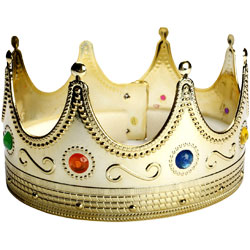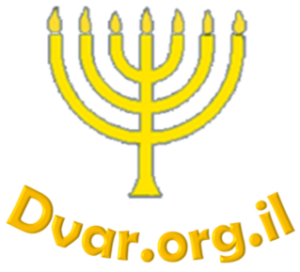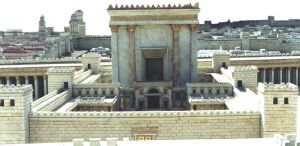Reform of Jewry 
THE REFORM OF JEWRY
“The mitzvah is a lamp and Torah is light; and ethical instructions produce a way of life” — Proverbs 6:23 (cf. Introduction to Shelah).
G-d created the world and man in order that man should use the world to fulfill G-d’s revealed Will, thus bringing the world to perfection (Creation-Revelation-Redemption).
When mankind as a whole did not fulfill G-d’s Will, He revealed it to a nation that He created: at Sinai, Israel was given the Written Law (Pentateuch) and Oral Law (later embodied in Talmud), in order that they become “a kingdom of priests and a holy nation,” by living a life of individual and national service to the Creator. World Redemption will come as a result of the example to be set by Israel.
Teaching and Practice
A salient feature of the Divine Law is its comprehensiveness: it governs all aspects of individual and social life, both spiritual and physical activities, and bids us unite our life in the service of the One G-d. There is no real equivalent in Biblical Hebrew for the word “religion,” for the Law of G-d impregnates all fields of human life, and there is no specifically “religious” sphere. The etymological concept of religion, from the Latin word “religare,” to bind, is alien to Jewish thought, for “no man is free but he who labors in the Torah” (Avoth 6:2); the nearest equivalent to it is this latter term, “Torah,” which in a narrower sense refers to the “teachings” of the Divine Law. Another term used is mitzvah, commandment, often denoting the practical part of the Revelation.
For Judaism is “pragmatic” in character; it provides not only lofty teachings, but also actual tools for molding both individual and society in accordance with them. By regulating action — which is under the more direct control of the will — the Jew can indirectly regulate the feelings — which are not — and thus sublimate his subconscious drives. The Torah, the teaching by itself, is like light, which is something abstract if it does not have a lamp: the mitzvah, the concrete form to hold it.
Progress
Judaism demands continuous progress and renewed effort towards moral perfection, leading to G-d-consciousness of the individual and the nation — a dynamic and revolutionary attitude to life, aiming at turning the imperfect world into Paradise. It requires sacrifice of comfort and self-sanctification[AS1] in the service of an all-demanding G-d.
The Torah has never been in accordance with the spirit of the times, with the thought and life of contemporaries. It formed a glaring contrast to the idolatry and barbarism of the nations surrounding
Universal Liberalism and Secular Nationalism
The French Revolution ushered in a period of liberal universalism to Europe. Many Jews, having gained emancipation and following the spirit of the time, confused universalism with uniformity, and strove for assimilation to non-Jewish standards of life. Thus arose the Jewish liberal movement, which denied the national character of Judaism, and regarded it as a religion similar to Christianity.
When, in the course of the nineteenth century, the European spirit changed to nationalism, many Jews, goaded on by anti-Semitism, followed suit. Denying the essentially religious character of Judaism, they regarded it as a nationality similar to other nationalities. Thus arose secular Zionism, which has culminated in the formation of the Jewish State.
Both liberalism and secular Zionism are movements tending towards assimilation: the former towards individual assimilation to non-Jewish standards of religion, and the latter towards national assimilation to non-Jewish standards of nationality.
Both movements, having arisen under Western European influence, miss the point: Judaism is a religion revealed to a nation — a G-d-nationhood. The Torah, a social as well as an individual way of life, finds its full realization in a Torah-state.
Total return to Torah
If the Torah presents us with problems, and if we find the mitzvoth devoid of meaning for ourselves today, the solution is a return to the Torah in its totality. Those who only affirm the doctrines have only the abstract light. The lamp of action is required to bring the spirit to life.
Those who keep to the mitzvoth mechanically, without fervor or feeling for their meaning, or study of the Torah, use the lamp without the light. “Forasmuch as this people draw near and with their mouth and with their lips do honor Me, but have removed their heart far from Me, and their fear of Me is a commandment of men learned by rote….” This rebuke of Isaiah 29:13 applies to many today; observance of the mitzvoth must not be motivated by adaption to one’s social environment, but should flow from the desire for G-d-consciousness.
“The sin of the unlit lamp and the ungirt loin” — if the lamp is never used to kindle the light, it is in the end discarded. This is the ultimate fate of the mitzvoth if observed mechanically. Instead, these symbolic, individual, and unified communal expressions of a life of service to the Creator must be used to draw us nearer to Him by reinforcing them with intensive study of the Torah.
A combination of Torah and mitzvah forms the light that will lead us through life. In order that Judaism may become a real way of life, however, special emphasis must be laid upon its “ethical instructions,” as the two great Jewish movements of modern times, Chassiduth (Saintliness) and Mussar (Ethics) have done. The ethical foundations of Judaism are neglected far too much by Jewry today, and that is why there are many Jews for whom Judaism has not become a real way of life.
n this age of decaying civilization, when the discrepancy between scientific knowledge and moral failure has carried the world to the brink of atomic self-annihilation — and when human beings are being tossed about by emotional conflicts and intellectual confusion — there is nothing required so much as a thoroughgoing reform; not of Judaism to non-Jewish standards of life, but a reform of Jewry to a high standard of integrated Torah-life and holiness; so that “the people that walk in darkness shall see light.”





